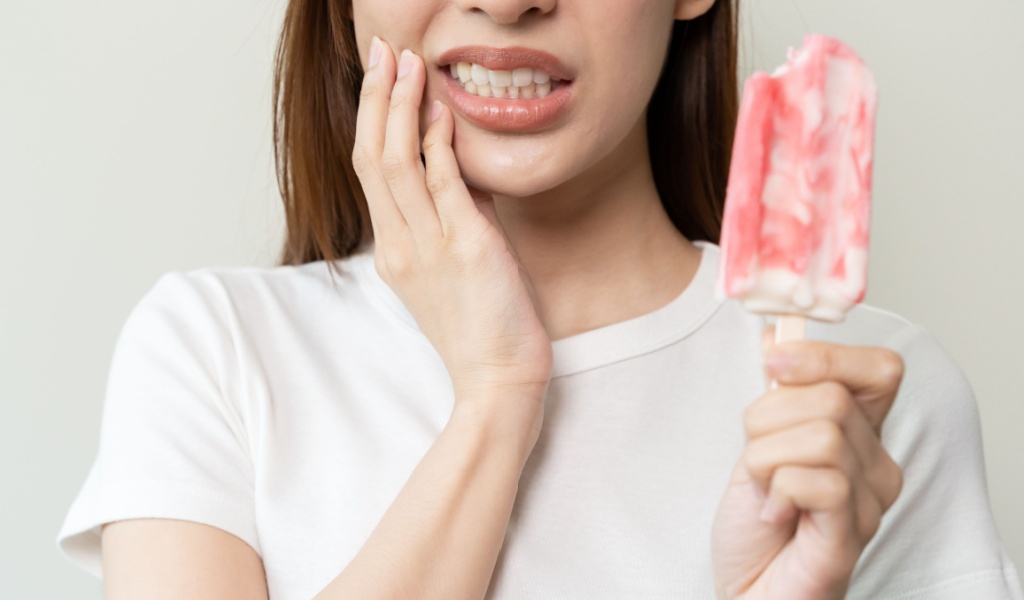If you’ve ever experienced a sudden, horrifying pain while sipping a hot cup of tea or biting into a chilly scoop of ice cream, you’re not alone. Sensitive teeth issues are more common than you think, and although they can make daily life a little complicated, there are easy methods to handle them. Let’s learn about the reasons why your teeth feel like they’re on a rollercoaster and discover some hands-on results to ease the discomfort.

Tooth Sensitivity, an Agony for Most
Sensitive teeth, known in dental circles as dentin hypersensitivity, can make even the most fundamental desires of life, such as breathing in cold air or relishing a piece of chocolate, feel like misery. However, let’s discover what’s truly causing this pain in your mouth.
The Science Behind Tooth Sensitivity
There are several layers in our teeth. The exterior layer, called enamel, is made to guard the gentler, weak layer below, called dentin. The dentin becomes uncovered when the enamel gets exhausted or the gums back off. Dentin comprises small tubes (or tubules) that lead straight to the nerve endings inside your teeth. When these tubules are exposed to strain, temperature variations, or specific foods, they can direct severe pain sensations to your nerves.
Factors that lead to tubule exposure are as follows:
Brushing Habits
Brushing too vigorously or using a hard-bristled toothbrush can fade the enamel and cause gum collapse.
Enamel Erosion
Acidic foods and beverages, such as soda, citrus fruits, or certain energy drinks, can trigger this. With time, these acids fade away the enamel, revealing the dentin.
Dental Problems
Cavities, broken teeth, or old fillings can also direct sensitivity by revealing the dentin or nerves.
Gum Recession
Gum disease or violent brushing can cause the gums to withdraw from the teeth, revealing the roots without enamel guards.
How to Deal with Tooth Sensitivity
There are many tactics you can use to handle and lessen tooth sensitivity. Here are some practical guidelines that will motivate you to enjoy life without discomfort:
Refrain From Acidic Foods and Drinks
If you’re susceptible to sensitivity, it might be better to refrain from consuming acidic foods and drinks. This includes tomatoes, citrus fruits, and vinegar-based dressings. Even if you occasionally consume these food items, make sure to rinse your mouth with water afterward to help neutralize the acids.
Exercise Gentle Brushing
Follow soft, circular motions when brushing. This can help prevent further deterioration of your enamel and lessen gum irritability. You must also stop brushing your teeth after eating acidic foods or drinks, as the enamel can briefly soften and weaken.
Use a Soft-Bristled Toothbrush
It might be tempting to clean your teeth with a hard-bristled brush, especially if you’re trying to get them spotless. However, a soft-bristled toothbrush is mild on both your gums and teeth and can help prevent further gum collapse and enamel damage.

Identify Dental Problems
If you doubt that dental issues like broken teeth or cavities are another reason for your sensitivity, it’s important to get them addressed immediately. Consistent dental check-ups can identify problems early and prevent them from getting worse.
Use Toothpaste with Desensitization
There are specific toothpastes made especially for sensitive teeth. These toothpastes consist of mixtures that block the routes to your nerves, lessening the ache you sense. It’s worth trying out a few different products to find one that suits you the most.
Consider Fluoride Treatments
Fluoride treatments can help firm enamel and decrease sensitivity. Your dentist can apply a fluoride ointment or varnish directly to your teeth, or you can use mouthwashes or toothpaste containing fluoride at home.
Use a Mouth Guard
Teeth grinding at night can lead to enamel erosion and sensitivity. Your dentist can create a customized mouthguard to shield your teeth from the harm produced by grinding.
Address Gum Recession
If your gums are declining, it’s vital to acknowledge the root cause, such as gum disease treatment or incorrect brushing technique. In rare cases, your dentist might suggest a gum implant or other measures to guard visible tooth roots.
When to Visit the Dentist
While these guidelines can help manage and lessen tooth sensitivity, there are instances when it’s necessary to consult a dentist. If you have severe or ongoing aches, they could indicate an underlying problem that needs dental care. A dentist can identify the exact reason for your sensitivity and suggest the best possible treatment choices.
Conclusion
Sensitive teeth can turn ordinary times into painful experiences. Nevertheless, learning about the root causes and understanding how to address the issues can make a substantial difference. By changing your oral care routine, avoiding triggers, and seeking expert guidance when required, you can have healthy teeth and live happily without restrictions.
So, the next time you find yourself wincing when sipping hot coffee or biting into a popsicle, remember that you’re not alone and not far from relief. By following the correct methods, you can relish your desired foods and drinks without that startling agony. Here’s to a pain-free and more relaxed smile!



